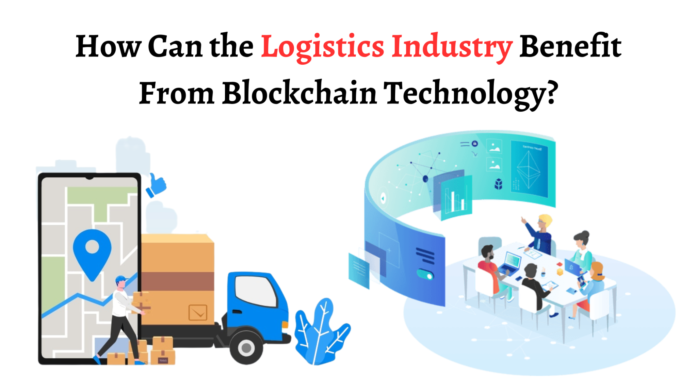As the world is becoming digital, the logistics industry is experiencing a rapid transformation in its operations.
The logistics industry is now leveraging the potential of Blockchain technology to streamline its supply chain operations and improve customer experience.
Blockchain technology has emerged as a game-changer for the logistics industry by offering greater transparency, efficiency, and security.
With the increasing use of Blockchain technology in logistics, business owners are now looking for a logistics app development company to simplify, speed up logistics, and increase transparency.
This blog will walk you through how Blockchain technology drives innovation in the logistics industry.
So, let’s get started and explore the exciting advantages of blockchain technology for the logistics industry.
Brief on what is Blockchain in Logistics?
Blockchain in logistics refers to the use of blockchain technology to improve the efficiency and transparency of supply chain management. Blockchain is a decentralized and immutable digital ledger that records transactions securely and transparently, making it ideal for logistics applications.
By implementing Blockchain in logistics, companies can track the movement of goods in real time, reduce fraud and errors, and simplify processes. This technology can create a tamper-proof record of every transaction in the supply chain, from the manufacturer to the end consumer.
It improves supply chain visibility, reduces costs, and enhances customer trust. Blockchain in logistics has the potential to transform the industry by enabling greater efficiency, security, and trust in the supply chain.
7 Innovative Ways Blockchain is Transforming Logistics Industry
1. Enhanced Transparency
Blockchain technology enhances transparency in logistics by creating an immutable and transparent ledger that records every transaction and movement of goods.
Each participant in the supply chain can view and track the movement of goods and verify the authenticity of the data, which eliminates the need for intermediaries and reduces the risk of errors, fraud, and delays.
With Blockchain, all participants can trust the integrity of the data and have a clear and real-time view of the entire supply chain.
This improved transparency leads to increased efficiency, reduced costs, and improved customer satisfaction.
2. Improved Shipping Operations
One of the main benefits of using Blockchain in logistics is improved shipping operations.
Blockchain allows greater transparency and accountability across the entire supply chain, enabling all parties involved to have real-time visibility into the movement of goods.
A Logistics app developed by a renowned mobile app development company can improve the efficiency of payments and financial transactions by enabling secure and fast settlements and reducing the need for intermediaries.
Hence, by using Blockchain technology, you can automate and streamline several manual processes, such as customs clearance and paperwork.
3. Reduced Paperwork
Blockchain technology has reduced paperwork in the logistics industry by providing a secure and transparent way to record and share information.
With a distributed ledger system, all parties in the supply chain can access and update the same information, reducing the need for multiple copies of documents and manual data entry.
Additionally, smart contracts can automatically trigger actions such as payments or alerts, reducing the need for paperwork and human intervention.
4. Enhanced Data Security
Blockchain technology enhances data security in logistics by creating a decentralized, tamper-proof ledger of transactions. It allows for increased transparency and accountability, as all parties involved in the logistics process have access to the same information.
Additionally, using cryptographic techniques ensures that data is protected from unauthorized access and manipulation, further enhancing the overall security of the logistics network.
5. Live Inventory Tracking
When Blockchain is combined with the latest technologies like AI, the Internet of Things, etc., it can be used to develop a real-time monitoring tracking management system.
Also, real-time tracking can help logistics companies optimize their operations and reduce costs by identifying inefficiencies and adjusting their strategies accordingly.
6. Cost Effective
Blockchain apps provide a secure and transparent platform for managing transactions and data in logistics systems.
Also, by leveraging distributed ledger technology, blockchain apps can enable real-time tracking of goods and reduce paperwork and manual processing. Which ultimately leads to cost savings through reduced administrative and operational expenses, improved efficiency, and better visibility into the supply chain.
Additionally, blockchain apps can automate payment and settlement processes using smart contracts, reducing transaction fees and potential errors.
7. Authenticity Verification
Blockchain technology also benefits users, not just business owners, as it creates an immutable and transparent ledger of transactions that cannot be altered.
By storing data in a decentralized and secure way, Blockchain can provide a trusted source of information that anyone with access to the network can verify.
This makes it an ideal solution for applications such as digital identity verification, supply chain tracking, and verification of digital assets, where authenticity and trust are essential.
To Summarize
The logistics industry stands to benefit significantly from the implementation of blockchain technology.
By creating a secure and transparent network, blockchain technology can help optimize the supply chain, enhance efficiency, and reduce costs. Additionally, it can help prevent fraud and increase accountability throughout the supply chain.
You can hire mobile app developers to create blockchain apps that significantly improve your logistic business.
Author Bio
Tom Hardy has over five years of experience as a senior software developer at SparxIT. He often writes about leading technologies like Blockchain, Node, ReactJS, and the latest technology trends in his free time.
















